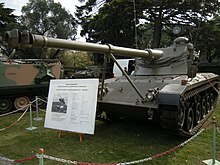Type a search term to find related articles by LIMS subject matter experts gathered from the most trusted and dynamic collaboration tools in the laboratory informatics industry.
| VC Tan Patagón | |
|---|---|
 A "Patagón" tank at the Argentine Army Exhibition, May 2008 | |
| Type | Light tank |
| Place of origin | Argentina |
| Service history | |
| Used by | Argentina |
| Production history | |
| Designed | early 2000s |
| No. built | 5 (including 1 prototype) |
| Specifications | |
| Mass | 16.5 tonnes (18.2 short tons; 16.2 long tons)[1] |
| Length | 5.582 m (18 ft 3.8 in)[1] |
| Width | 2.5 m (8 ft 2 in) [1] |
| Height | 2.88 m (9 ft 5 in) [n 1] |
| Crew | 3 (Commander, gunner, driver) |
| Armor | base: 8 mm (0.31 in) maximum: 40 mm (1.6 in) [n 2] |
Main armament | 105 mm rifled gun |
Secondary armament | 7.62×51mm NATO co-axial machine gun |
| Engine | Steyr 7FA / 6-cylinder diesel engine[n 3] 300 hp (220 kW) [1] [n 4] |
| Power/weight | 18.2 hp / tonne |
| Suspension | torsion bar, 5 road wheels |
Operational range | 520 kilometres (320 mi)[1] [n 5] |
| Maximum speed | 70 km/h (43 mph)[n 6] |
The "Patagón" tank is a light tank developed in Argentina during the early 2000s, that was expected to enter service with the Argentine Army. It is based on a SK-105 Kürassier chassis with a refurbished AMX-13 turret. The project was cancelled in late 2008 after five tanks were converted.[2]

In 2003 the Argentine Army defined goals for increasing its capabilities, among them nationalizing the manufacturing of its equipment; the VC SK-105 "Patagón" tank upgrade project was part of that effort.[3] It was planned to convert and upgrade up to 40 vehicles at an expected cost of USD 23,4 million in the period 2005-2009; these vehicles were going to be assembled in Comodoro Rivadavia and provided to the army units based in Patagonia.[3][4]
The vehicle is composed of a SK-105 Kürassier chassis which mounts a refurbished FL-12 oscillating turret armed with a 105 mm gun, obtained from obsolete AMX-13 tanks. Both vehicles were in service with the Argentine Army in the early 2000s. Most of the Patagón technical specifications are similar to the SK-105.[2]
The Patagón prototype was unveiled on 22 November 2005; however the project was cancelled in late 2008, as it was considered uneconomical.[2]
As of late 2014 four units have been completed, in addition to the prototype unveiled in 2005.[2]